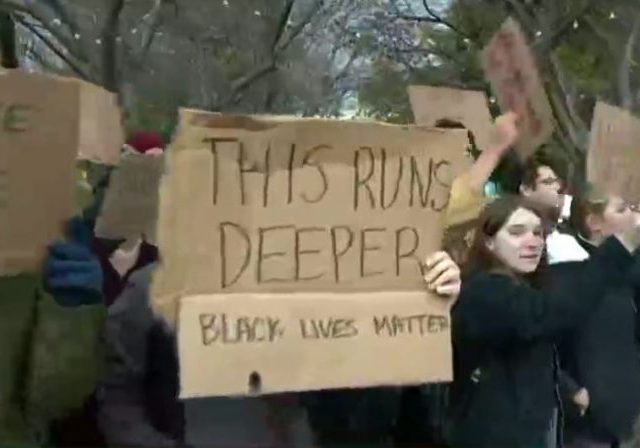Oberlin College denied new trial in Gibson’s Bakery case

In the Gibson’s Bakery v. Oberlin College case, the judgment for the plaintiffs amounted to almost $32 million in damages and defendants were required to post a $36 million bond to secure the judgment pending appeal.
Before appealing, Oberlin College filed two post-trial motions, a Motion for Judgment Notwithstanding The Verdict (pdf.) and Motion for a New Trial (pdf.), as explained in our post, Oberlin College Seeks New Trial in Gibson’s Bakery Case.
Gibson’s Bakery responded with an Opposition to the Motion for Judgment Notwithstanding The Verdict (pdf.), and Opposition to the Motion for a New Trial (pdf.), as explained in our post, Gibson’s Bakery: Oberlin College’s request for a new trial is “baseless”.
Judge John Miraldi has ruled, denying both motions. The Order Denying Motion for Judgment Notwithstanding the Verdict (pdf.) and Order Denying Motion for New Trial (pdf.) are embedded at the bottom of the post.
In the JNOV Order, the Court ruled in pertinent part:
Judgment notwithstanding the verdict is only appropriate where, when the evidence is construed most strongly in favor of the nonmoving party, reasonable minds can come to one conclusion, and that conclusion is adverse to the non-moving party. See McMichael v. Akron General Medical Center, 2017-Ohio-7594, ,r 1 O (Ohio Ct. App. 9th Dist.); see a/so Goodrich, at ¶ 11.The Court has reviewed and considered the parties’ respective briefs and applicable precedent and, after construing the evidence most strongly in Plaintiff’s favor, the Court does not find that the Defendants are entitled to judgment notwithstanding the verdict. Accordingly, Defendants’ Motion for Judgment Notwithstanding the Verdict is denied.
In the New Trial Order, the Court ruled in pertinent part:
Ohio Civ. R. 59(A) empowers a trial court to grant a new trial when a party has been awarded “[e]xcessive or inadequate damages, appearing to have been given under the influence of passion or prejudice”. Tesar Indus. Contractors, Inc. v. Republic Steel, 2018-Ohio-2089, ¶¶ 31 (Ohio Ct. App. 9th Dist.) (internal citations omitted).Having considered the parties respective briefs and arguments and applicable precedent, the Court finds that the amount awarded is not manifestly excessive nor does it appear to be influenced by passion or prejudice. Accordingly, Defendants’ Motion for a New Trial or Remittitur is denied.
In neither Order did the Court address what I found to be the only “interesting” issue, the jury verdict form on compensatory damages that found no “actual malice,” yet the jury considered bad intent as part of punitive damages. Apparently the Court did not find it sufficiently interesting to address separately. Perhaps it’s not actually an interesting or effective argument by defendants, since they sought a bifurcated compensatory/punitive damages trial which precluded plaintiffs from presenting evidence relevant to punitive damages during the compensatory phase. In this bifurcated setting, to hold that a ruling as to actual malice during the compensatory phase could preclude consideration of the issue for punitive damages would be circular and allow defendants to defeat punitive damages as to defamation without plaintiffs having been able to present evidence on the issue.
There was a third court ruling, denying plaintiffs’ request for prejudgment interest. Prejudgment interest is available in Ohio upon a showing of bad faith in the litigation. The Court’s Order Denying Prejudgment Interest (pdf.)(full embed at bottom of post) held in pertinent part:
This case has been pending since November of 2017, and the Court has been highly involved in nearly every phase of the litigation, including presiding over several in-person pretrials, a lengthy final pretrial, and ultimately the six-week trial that concluded this case. Through this involvement, the Court frequently interacted with the parties’ respective counsel, and was thoroughly familiar with their positions and strategies as they evolved throughout the litigation. Ultimately, the parties were unable to reach a resolution. But, from the Court’s perspective, this was not a product of the Defendants’ bad faith, as contemplated by Ohio Revised Code § 1343.03, it was simply a case where the parties’ dispute of the issues and application of the law required a trial of those issues. The correspondence that makes up nearly all of the parties’ evidentiary materials is consistent with that finding and with the Court’s observation above. Accordingly, and as stated above, Plaintiffs’ Motion for Prejudgment Interest is denied.
I have not had a chance to review the voluminous papers submitted as to settlement negotiations, and may follow up with a post about that later.
Now what? Appeal.
——————————
Gibson’s Bakery v. Oberlin College – Order Denying Motion for Prejudgment Interest by Legal Insurrection on Scribd
——————————
Gibson’s Bakery v. Oberlin College – Order Denying Motion for New Trial by Legal Insurrection on Scribd
——————————
Gibson’s Bakery v. Oberlin College – Order Denying Motion for Prejudgment Interest by Legal Insurrection on Scribd
CLICK HERE FOR FULL VERSION OF THIS STORY